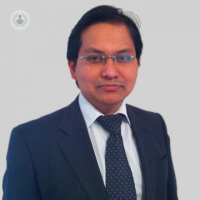An expert's guide to Bell's palsy
Written by:Bell’s palsy is a condition that causes facial paralysis on one side of the face, causing that side to droop. In his latest article, Mr Ruben Kannan, a global leader in the field of facial palsy, explains this condition in detail.

What is Bell's palsy?
Bell's palsy is a type of facial paralysis. It is caused by either a viral infection or a condition when one's own immune system attacks certain types of tissue e.g., nerves in the body. As a result of these processes, the facial nerve can swell up.
As the facial nerve traverses the skull, it can become strangled and compressed . This compression then switches off the nerve temporarily, resulting in a drooping face.
Can Bell's palsy be treated without surgery?
Yes. In the majority of cases, Bell's palsy can be managed with a combination of facial physiotherapy and Botox injections, where appropriate.
What is the role of surgery in the treatment of Bell's palsy?
In approximately 5% of my patients, a surgical procedure to release tight muscles in the neck can be performed to alleviate the symptoms of neck pain that many patients suffer from. This procedure can also help improve a patient's smile and reduce unwanted and uncoordinated facial movements called synkinesis. A clinical illustration is shown below.
A young lady had Bell's palsy a few years ago and developed significant neck tightness and pain. This also affected her smile, as she struggled to overcome the tightness in the neck. The first image is the patient following long-term facial rehabilitation as well as Botox, while the following image shows the same patient at six weeks post-op, without any therapy and/or Botox injections.
Pre-op:

Post-op:

What is involved in recovery from facial reanimation surgery?
The surgery is a general anaesthetic procedure, which takes approximately three hours to perform. The risks of the procedure are similar to any facelift procedure: bleeding, infection, excessive scarring, wound breakdown, and anaesthetic risks, DVT, pulmonary embolism, no improvement, further surgery, reduced facial sensation and damage to the existing facial nerve branches (2%). That said, the complication risk is low with the most significant complication being bleeding with haematoma formation. In most cases, patients are sent home after one day in hospital, with a wound check at one-week post-op.
In my practice, the sutures are all buried and absorbable. Approximately one month after surgery, the facial therapy team will get involved in facial rehabilitation with the result being apparent by nine months post-op. Longer-term, with continued facial therapy, these results can be maintained.
If you are worried about Bell’s palsy or any other related condition, you can book a consultation with Mr Ruben Kannan via his Top Doctors profile.


